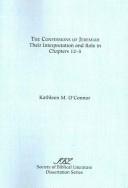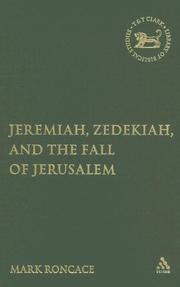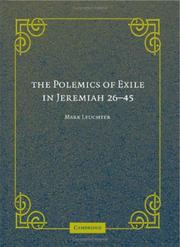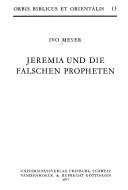| Listing 1 - 10 of 14 | << page >> |
Sort by
|

ISBN: 1555400000 1555400019 9781555400002 9781555400019 Year: 1988 Volume: 94 Publisher: Atlanta: Scholars Press,
Abstract | Keywords | Export | Availability | Bookmark
 Loading...
Loading...Choose an application
- Reference Manager
- EndNote
- RefWorks (Direct export to RefWorks)
Jeremiah --- Bible. --- Criticism, interpretation, etc. --- 224.3 --- Jeremias. Lamentationes. Klaagliederen --- Jeremiah (Biblical prophet) --- Ieremii︠a︡ --- Jeremia --- Jeremiah, --- Jérémie --- Jeremy --- Yirmeyahu --- ירמיהו --- Jeremiah - (Biblical prophet) --- Eremia

ISBN: 1281802689 9786611802684 0567159981 0567486788 9780567486783 056702671X 9780567026712 9781281802682 6611802681 9780567159984 Year: 2005 Volume: 423 Publisher: New York : T&T Clark,
Abstract | Keywords | Export | Availability | Bookmark
 Loading...
Loading...Choose an application
- Reference Manager
- EndNote
- RefWorks (Direct export to RefWorks)
*Uses both a narratological and historical-critical method to read these specific passages of Jeremiah*Demonstrates that the story of Jeremiah and Zedekiah is not the typical god prophet/bad king story found in much of prophetic literature and the Deuteronomic History*Provides an intertextual reading of the passages which connects Jeremiah to other figures in the Old TestamentThe book offers a narratological and intertextual reading of Jeremiah 37:1-40:6, a text that features the dynamic interaction between the prophet Jeremiah and King Zedekiah in the context of events surrounding the fall of
Prophets. --- Minor prophets --- Prophethood --- Seers --- Persons --- Jeremiah --- Ieremii︠a︡ --- Jeremia --- Jeremiah, --- Jérémie --- Jeremy --- Yirmeyahu --- ירמיהו --- Bible. --- Criticism, Narrative. --- 224.3 --- Jeremias. Lamentationes. Klaagliederen --- Eremia
Book
ISBN: 9033451360 Year: 2002 Publisher: Leuven Leuven Acco Vlaamse Bijbelstichting
Abstract | Keywords | Export | Availability | Bookmark
 Loading...
Loading...Choose an application
- Reference Manager
- EndNote
- RefWorks (Direct export to RefWorks)
Bible OT. Major prophets. Jeremiah --- Jeremia --- Jérémie --- 224.3 --- #GGSB: Exegese O.T. --- #GGSB: Tekstkritiek O.T. --- #GGSB: Profeten --- #gsdb1 --- C1 --- exegese --- Bijbel --- profeten (x) --- Oud Testament --- Jeremia (profeet) --- Jeremias. Lamentationes. Klaagliederen --- Kerken en religie --- #GGSB: Exegese O.T --- #GGSB: Tekstkritiek O.T --- Jeremiah --- Ieremii︠a︡ --- Jeremiah, --- Jérémie --- Jeremy --- Yirmeyahu --- ירמיהו --- Exegese O.T --- Profeten --- Tekstkritiek O.T --- Eremia

ISBN: 9780521879910 0521879914 9780511551147 9780521182768 9780511508110 0511508115 0511551142 1107184045 051150411X 0511508778 0511506252 052118276X Year: 2008 Publisher: Cambridge Cambridge University Press
Abstract | Keywords | Export | Availability | Bookmark
 Loading...
Loading...Choose an application
- Reference Manager
- EndNote
- RefWorks (Direct export to RefWorks)
Scholars typically view Jeremiah 26-45 as a collection of episodes constructed during the Babylonian exile that attempts to prove the authenticity of Jeremiah's prophetic status. But Jeremiah's prophetic legitimacy was already widely accepted during the period of the Babylonian exile. These chapters serve a different purpose, namely, to provide a response by the Deuteronomistic scribes to the rise of the Ezekiel tradition and the Zadokite priesthood that threatened their influence among the exilic population. By subsuming their work within an existing and earlier collection of Jeremianic literature, the ideology and political agenda of the Deuteronomists was fused with the literary legacy of a widely respected prophet, giving rise to a larger literary collection that left a profound and lasting impression on Israel's intellectual and social history.
Deuteronomistic history (Biblical criticism) --- Jeremiah --- Bible. --- Criticism, interpretation, etc. --- 224.3 --- Deuteronomic history (Biblical criticism) --- Deuteronomists (Biblical criticism) --- DH (Biblical criticism) --- D document (Biblical criticism) --- Jeremias. Lamentationes. Klaagliederen --- Ieremii︠a︡ --- Jeremia --- Jeremiah, --- Jérémie --- Jeremy --- Yirmeyahu --- ירמיהו --- Arts and Humanities --- Religion --- Jeremiah - (Biblical prophet) --- Eremia
Book
ISBN: 1282345370 9786612345371 3110212811 9783110212815 3110205068 9783110205060 9783110205060 9781282345379 6612345373 Year: 2009 Publisher: Berlin ; New York : Walter de Gruyter,
Abstract | Keywords | Export | Availability | Bookmark
 Loading...
Loading...Choose an application
- Reference Manager
- EndNote
- RefWorks (Direct export to RefWorks)
This volume contains the proceedings of a Symposium "Prophecy in the Book of Jeremiah", arranged by the Edinburgh Prophecy Network in the School of Divinity at the University of Edinburgh, 11-12 May 2007. Prophetic studies are undergoing radical changes at the moment, following the breakdown of a methodological consensus in humanities and biblical studies. One of the challenges today concerns the question how to deal with history in a "post-modern" age. The French Annales School and narrative theory have contributed toward changing the intellectual climate of biblical studies dramatically. Whereas the "historical Jeremiah" was formerly believed to be hidden under countless additions and interpretations, and changed beyond recognition, it was still assumed that it would be possible to recover the "real" prophet with the tools of historical critical methods. However, according to a majority of scholars today, the recovery of the historical Jeremiah is no longer possible. For this reason, we have to seek new and multimethodological approaches to the study of prophecy, including diachronic and synchronic methods. The Meeting in Edinburgh in 2007 gathered specialists in prophetic studies from Denmark, Finland, Germany, the Netherlands, United Kingdom and the USA, focusing on different aspects of the prophet Jeremiah. Prophetic texts from the whole Hebrew Bible and ancient Near Eastern prophecy are taken into consideration.
Jeremia (Buch). --- Jeremiah. --- Prophecy. --- Prophezeiung. --- RELIGION / Biblical Criticism & Interpretation / Old Testament. --- Jeremiah --- Ieremii︠a︡ --- Jeremia --- Jeremiah, --- Jérémie --- Jeremy --- Yirmeyahu --- ירמיהו --- Bible. --- Jeremiabuch --- Jeremiah (Book of the Old Testament) --- Jérémie (Book of the Old Testament) --- Livre de Jérémie --- Yirmeyah (Book of the Old Testament) --- Yirmeyahu (Book of the Old Testament) --- Criticism, interpretation, etc. --- Eremia
Book
ISBN: 2204019992 9782204019996 Year: 1983 Volume: 62 Publisher: Paris: Cerf,
Abstract | Keywords | Export | Availability | Bookmark
 Loading...
Loading...Choose an application
- Reference Manager
- EndNote
- RefWorks (Direct export to RefWorks)
Jeremiah --- Bible --- Criticism, interpretation, etc --- 224.3 --- #GROL:SEMI-224.3 --- Jeremias. Lamentationes. Klaagliederen --- Jeremiah (Biblical prophet) --- Ieremii︠a︡ --- Jeremia --- Jeremiah, --- Jérémie --- Jeremy --- Yirmeyahu --- ירמיהו --- Bible. --- Jeremiabuch --- Jeremiah (Book of the Old Testament) --- Jérémie (Book of the Old Testament) --- Livre de Jérémie --- Yirmeyah (Book of the Old Testament) --- Yirmeyahu (Book of the Old Testament) --- Criticism, interpretation, etc. --- Jeremiah - (Biblical prophet) --- Eremia

ISBN: 3727801662 9783727801662 Year: 1977 Volume: 13 Publisher: Freiburg: Universitätsverlag,
Abstract | Keywords | Export | Availability | Bookmark
 Loading...
Loading...Choose an application
- Reference Manager
- EndNote
- RefWorks (Direct export to RefWorks)
Prophets --- Jeremiah --- Bible --- Criticism, interpretation, etc --- 224.3 --- #GROL:SEMI-22<08> Orbi 13 --- Minor prophets --- Prophethood --- Seers --- Persons --- Jeremias. Lamentationes. Klaagliederen --- Jeremiah (Biblical prophet) --- Ieremii︠a︡ --- Jeremia --- Jeremiah, --- Jérémie --- Jeremy --- Yirmeyahu --- ירמיהו --- Bible. --- Jeremiabuch --- Jeremiah (Book of the Old Testament) --- Jérémie (Book of the Old Testament) --- Livre de Jérémie --- Yirmeyah (Book of the Old Testament) --- Yirmeyahu (Book of the Old Testament) --- Criticism, interpretation, etc. --- Jeremiah - (Biblical prophet) --- Eremia
Book
ISBN: 311054069X 9783110540697 9783110542721 9783110543377 3110542722 3110543370 Year: 2017 Volume: 506 Publisher: Berlin: de Gruyter,
Abstract | Keywords | Export | Availability | Bookmark
 Loading...
Loading...Choose an application
- Reference Manager
- EndNote
- RefWorks (Direct export to RefWorks)
The oldest parts of the Book of Jeremiah, that according to K.-F. Pohlmann (1978), C. Levin (1985), K. Schmid (1996) and others can be found in Jeremiah 4-6, 8-10, complain of the devastation of the country by an enemy coming from the north. However, they do not name the name Jeremiah, nor can they be called "prophetic" in the ancient Near Eastern sense. In this aspect, the lamentations in Jeremiah 4: 19-22; 6.9 to 15; 8.18 to 23; 10,19-25 are subjected to a historical-critical examination and to a comprehensive comparison with the ancient Near Eastern literature of kalu. The results of the comparative study as well as the findings on the non-Biblical, ancient Near Eastern relationship of lament and prophetic literature present a new perspective on the genesis of the Jeremiah book. Because the core of the book is based on cultic complaints, lines of editorial history can be drawn on the one hand into Jeremiah's court prophecy and on the other hand into the further development of the lamentation theme up to the so-called "confessions." Further, the texts examined in Jeremiah 4-6; 8-10; 7; 11; 14-15 offer new conclusions about the representation of the literary Jeremiah as an intercessor and court prophet.
Intercessory prayer --- Laments in the Bible --- 224.3 --- 224.3 Jeremias. Lamentationes. Klaagliederen --- 224.3 Jeremie. Lamentations de Jeremie --- Jeremias. Lamentationes. Klaagliederen --- Jeremie. Lamentations de Jeremie --- Intercession (Prayer) --- Prayer --- Biblical teaching --- Jeremiah --- Ieremii︠a︡ --- Jeremia --- Jeremiah, --- Jérémie --- Jeremy --- Yirmeyahu --- ירמיהו --- Bible. --- Jeremiabuch --- Jeremiah (Book of the Old Testament) --- Jérémie (Book of the Old Testament) --- Livre de Jérémie --- Yirmeyah (Book of the Old Testament) --- Yirmeyahu (Book of the Old Testament) --- Criticism, interpretation, etc. --- Eremia
Book
ISBN: 906186819X 9068319418 9789061868194 Year: 1997 Volume: 54 Publisher: Leuven: Leuven university press,
Abstract | Keywords | Export | Availability | Bookmark
 Loading...
Loading...Choose an application
- Reference Manager
- EndNote
- RefWorks (Direct export to RefWorks)
Ancien Testament --- Jeremia --- Jérémie --- Oude Testament --- Jeremiah (Biblical prophet) --- Academic collection --- 224.3 --- Jeremias. Lamentationes. Klaagliederen --- Jeremiah --- Ieremii︠a︡ --- Jeremiah, --- Jérémie --- Jeremy --- Yirmeyahu --- ירמיהו --- Bible. --- Jeremiabuch --- Jeremiah (Book of the Old Testament) --- Jérémie (Book of the Old Testament) --- Livre de Jérémie --- Yirmeyah (Book of the Old Testament) --- Yirmeyahu (Book of the Old Testament) --- Criticism, interpretation, etc. --- -Addresses, essays, lectures --- Bible. Old Testament. Jeremiah --- Criticism, interpretation, etc --- Jeremiah (Biblical prophet) - Addresses, essays, lectures --- Eremia
Book
ISSN: 21981183 ISBN: 9783525540732 3525540736 Year: 2020 Volume: 272 Publisher: Göttingen: Vandenhoeck und Ruprecht,
Abstract | Keywords | Export | Availability | Bookmark
 Loading...
Loading...Choose an application
- Reference Manager
- EndNote
- RefWorks (Direct export to RefWorks)
There is a longstanding scholarly debate on the nature of prophecy in ancient Israel. Until now, no study has based itself on the semantics of the Hebrew lexeme nābîʾ (“prophet”). This investigation by William L. Kelly discusses the nature and function of prophecy in the corpus of the Hebrew book of Jeremiah. It analyses all occurrences of nābîʾ in Jeremiah and performs a close reading of three primary texts, Jeremiah 1.4–19, 23.9–40 and 27.1–28.17. The result is a detailed explanation of how prophecy works, and what it meant to call someone a nābîʾ in ancient Israel. Combining the results of the semantic analysis and close readings, the study reaches conclusions for six main areas of study: (1) the function and nature of prophecy; (2) dreams and visions; (3) being sent; (4) prophets, priests and cult; (5) salvation and doom; and (6) legitimacy and authority. These conclusions explain the conceptual categories related to nābîʾ in the corpus. I then situate these findings in two current debates, one on the definition of nābîʾ and one on cultic prophecy. This study contributes to critical scholarship on prophecy in the ancient world, on the book of Jeremiah, and on prophets in ancient Israel. It is the first major study to analyse nābîʾ based on its semantic associations. It adds to a growing consensus which understands prophecy as a form of divination. Contrary to some trends in Jeremiah scholarship, this work demonstrates the importance of a close reading of the Masoretic (Hebrew) text. This study uses a method of a general nature which can be applied to other texts. Thus there are significant implications for further research on prophecy and prophetic literature.
Prophecy --- Nābîʼ (The Hebrew word) --- 224.3 --- 224.3 Jeremias. Lamentationes. Klaagliederen --- 224.3 Jeremie. Lamentations de Jeremie --- Jeremias. Lamentationes. Klaagliederen --- Jeremie. Lamentations de Jeremie --- Hebrew language --- Forecasting --- Etymology --- Jeremiah --- Ieremii︠a︡ --- Jeremia --- Jeremiah, --- Jérémie --- Jeremy --- Yirmeyahu --- ירמיהו --- Bible. --- Jeremiabuch --- Jeremiah (Book of the Old Testament) --- Jérémie (Book of the Old Testament) --- Livre de Jérémie --- Yirmeyah (Book of the Old Testament) --- Yirmeyahu (Book of the Old Testament) --- Criticism, interpretation, etc. --- Jeremiah - (Biblical prophet) --- Eremia
| Listing 1 - 10 of 14 | << page >> |
Sort by
|

 Search
Search Feedback
Feedback About UniCat
About UniCat  Help
Help News
News